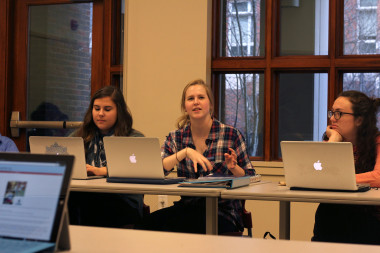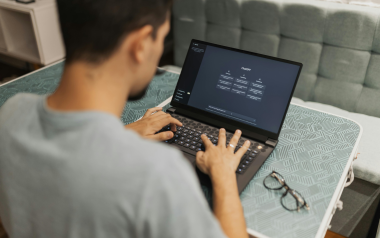Sample Statements
This CTE resource contains sample syllabus statements covering a range of topics, such as the UVA Honor Code, Title IX, and student wellbeing.
Accessibility
Statement from Sheryl Burgsthaler’s Syllabus
Sheryl E. Burgstahler is the author of Universal Design in Higher Education: From Principles to Practice. (2015, second edition). Harvard Education Press.
This course is designed to be welcoming to, accessible to, and usable by everyone, including students who are English-language learners, have a variety of learning preferences, have disabilities, or are new to online learning. Be sure to let me know immediately if you encounter a required element or resource in the course that is not accessible to you. Also, let me know of changes I can make to the course so that it is more welcoming to, accessible to, or usable by students who take this course in the future.
There are accessibility features within your browser and eCollege over which you have control. For example, you can choose in your web browser to view larger text on the screen. In eCollege, you can select within "notifications" options to receive email messages when posts are made to the discussion board. Some individuals, including those who are blind and using screen readers to read aloud text on the screen, find it easier to follow discussions when posts are presented to them in an email message.
(This section in the syllabus is followed by a section “Disability-Related Accommodations“ that includes the standard accommodations statement for my university.)
Basic Needs Security
Statement from Sara Goldrick-Rab's Syllabus
Any student who has difficulty affording groceries or accessing sufficient food to eat every day, or who lacks a safe and stable place to live and believes this may affect their performance in the course is urged to contact the CASS on Call (formerly the "Dean on Call" program) for support. Furthermore, please notify the professor if you are comfortable in doing so. This will enable her to provide any resources that she may possess.
Read Goldrick-Rab's blog post about her Basic Needs Security statement.
Communicating Care
What beliefs about teaching, learning, and humanity do you bring to the course? Consider what influences your teaching plans and philosophy, and if they warrant a standalone section in the syllabus or distribution throughout.
Sample Language for Inclusive Teaching Philosophy
I recognize and value the many perspectives my students bring to the classroom. Many factors—social identities, visible and invisible disabilities, family circumstances, physical location, mental health, access to the internet—all influence the experiences that every individual can have in my courses this and every semester. I am committed to building an environment to support your learning, one in which you will be supported and rewarded for going out on a limb to communicate and defend your ideas.
Sample Language for Supporting Black Lives
I acknowledge that racism and white supremacy are baked into both the history of UVA as an institution and the history of higher education as a whole. I believe that my pedagogical philosophies and practices can either reinforce inequities or work to eliminate them. I am committed and actively working to be a better, more careful listener; continuing to learn about the ways systemic injustices disadvantage my Black students and colleagues and other students and colleagues of color in and out of the classroom; and advocating for and implementing anti-racist educational practices. I will hold myself accountable, encourage you to help me do so, and invite you to join me in this work.
Sample Language for Welcoming Immigrants
Students of all immigration statuses are welcomed and valued in this classroom, including undocumented students, students from mixed-status families, and students with Temporary Protected Status. As an educator, I aim to create a learning environment that respects and affirms the diversity of students’ experiences and perspectives. If your status is impacting your success in the course, please come see me to discuss things I can do to accommodate you (assignments, attendance, etc.). I pledge to keep your status confidential unless required by judicial warrant.
Honor
From Arts & Sciences Course
I trust every student in this course to fully comply with all of the provisions of the University’s Honor Code. By enrolling in this course, you have agreed to abide by and uphold the Honor System of the University of Virginia, as well as the following policies specific to this course.
All graded assignments must be pledged.
[In this section, faculty members often list additional policies relating to:
whether collaboration is permitted on any assignment(s);
citation expectations for written work;
what (if any) resources are permitted for use on examinations.]
[e.g. Plagiarism is considered a violation of the honor code. What is plagiarism? Generally speaking, it is any attempt to take credit for work done by another person. All historians, including undergraduates, must rely on the work of others to shape their own knowledge and interpretations. In their writing they must acknowledge the importance of other works through footnotes and/or direct textual references to influential books, articles, and ideas. Failure to acknowledge the work of others, or transposing sentences, words, and concepts into your own work without using quotation marks or citations can result in plagiarism.]
[e.g. Working with a professor, tutor, or friend to clarify your ideas and organization for a paper or presentation is generally not plagiarism. Using an outline or thesis given to you by someone else without substantial modification is plagiarism. If you have any questions about what may constitute plagiarism, please consult with me. There is no penalty for honest inquiry or confusion!]
All suspected violations will be forwarded to the Honor Committee, and you may, at my discretion, receive an immediate zero on that assignment regardless of any action taken by the Honor Committee.
Please let me know if you have any questions regarding the course Honor policy. If you believe you may have committed an Honor Offense, you may wish to file a Conscientious Retraction by calling the Honor Offices at (434) 924-7602. For your retraction to be considered valid, it must, among other things, be filed with the Honor Committee before you are aware that the act in question has come under suspicion by anyone. More information can be found here. Your College of Arts & Sciences Honor representatives are Evan Berhle (ebb3tf), Conor O'Boyle (cot5zc), Andi Chernau (akc2ya), Brittany Wengel (bew4ke), Michelle Butler (mlb4cc) and Josh Myers (jmm4cm). Faith Lyons, an Honor support officer enrolled in this class, is also available for questions.
From McIntire School of Commerce
The McIntire School of Commerce relies upon and cherishes its community of trust. We endorse and uphold the University’s Honor principle that students will not lie, cheat, or steal, nor shall they tolerate those who do. We recognize that even one honor infraction can destroy an exemplary reputation that took years to build. Acting in a manner consistent with the principles of honor benefits every member of the community while enrolled in the McIntire School and in the future.
We trust every McIntire student to comply fully with all provisions of the UVa Honor System. By enrolling in this course, you agree to abide by and uphold the Honor System of the University of Virginia, as well as the following policies specific to ICE:
All graded assignments must be pledged.
You may not access any notes, study outlines, problem sets, old exams, answer keys, or collaborate with other students without our explicit permission.
When given permission to collaborate with others, do not copy answers from another student.
Always cite any resources or individuals you consult to complete an assignment. If in doubt, cite the source.
All suspected violations will be forwarded to the Honor Committee, and, at our discretion, you may receive an immediate zero on that assignment regardless of any action taken by the Honor Committee.
If you have a question about what is or is not permitted on an assignment, you should clarify your question with the professor prior to doing the work.
If you believe you may have committed an Honor Offense, you may wish to file a Conscientious Retraction (“CR”) by calling the Honor Offices at (434) 924-7602. For your retraction to be considered valid, it must, among other things, be filed with the Honor Committee before you are aware that the Act in question has come under suspicion by anyone. More information can be found here. If you have questions regarding the course Honor policy, please contact your honor representatives or ICE faculty.
Flexibility and Contingency Plans
How will your course and course policies adapt to sudden changes in instructional mode or other disruptions? Policies about flexibility should be closely tailored to the specific circumstances of the course.
What will your students do in the event that you, they, or a loved one becomes ill? What is the backup plan for when you, a co-instructor, or TA fall ill?
Will travel-related delays, such as quarantine requirements, prevent some of your students from attending the first several days of class?
How will your course address absences and makeup activities especially due to coronavirus exposure or illness? Are there comparable virtual activities available? Flexible assessment and grading practices? Consider the ‘hot spot’ nature of outbreaks and the possibility that entire groups of students may be missing.
There are many unknowns this semester that could impact our course and university. We have already seen a delay of in-person classes to protect the health and safety of our community, and additional delays and disruptions may occur. Live classes will be held via Zoom (UVACollab “Online Meetings”), and it is possible that we will move to pre-recorded lecture material and more asynchronous activities that you’ll complete on your own with regular feedback from me. We will, as a community, need to be flexible and take things one step at a time. I’ll use email and post an announcement on our UVACollab site if such a shift suddenly occurs.
In our course, flexibility includes... {specific policies here, such as a limited number of free requests/tokens for deadline extensions, flexibility in the number of items contributing to an overall grade, how much advance notice is required for requesting assignment modifications, etc.}
Flexibility also includes communication. I encourage you to have a plan for communicating with instructors in case you become ill. In the event that I become ill, I will contact a colleague and/or my department chair to communicate with you about how our course will proceed. Please pay close attention to email communications and/or UVACollab announcements throughout this semester.
Immigration Statuses
Statement Developed by undocUVA Faculty Executive Board
Students of all immigration statuses are welcomed and valued in this classroom, including undocumented students, students from mixed-status families, and students with Temporary Protected Status. As an educator, I aim to create a learning environment that respects and affirms the diversity of students’ experiences and perspectives. If your status is impacting your success in the course, please come see me to discuss things I can do to accommodate you (assignments, attendance, etc.). I pledge to keep your status confidential unless required by judicial warrant.
Wellbeing & Safety
Wellbeing Statement From McIntire School of Commerce
The McIntire School of Commerce proudly serves as a safe space for its students and aims to promote their wellbeing. If you are feeling overwhelmed, stressed, or isolated, there are many individuals here who are ready and wanting to help. If you wish, you can make an appointment with any of your ICE faculty and go to their office to talk in private. The faculty members at the Student Services Office, located on the third floor, are also readily accessible to talk during walk-in hours or through setting up an appointment.
Alternatively, there are also other University of Virginia resources available. The Student Health Center offers Counseling and Psychological Services (CAPS) for its students. Call 434-243-5150 (or 434-972-7004 for after hours and weekend crisis assistance) to get started and schedule an appointment. If you prefer to speak anonymously and confidentially over the phone, call Madison House’s HELP Line at any hour of any day: 434-295-8255.
If you or someone you know is struggling with gender, sexual, or domestic violence, there are many community and University of Virginia resources available. Student Affairs, Sexual Assault Resource Agency (SARA), Shelter for Help in Emergency (SHE), and UVA Women’s Center are ready and eager to help. Contact the Director of the Gender Violence and Social Change Program at 434-982-2774.
Student Safety Statement from Arts & Sciences Course
The University of Virginia is dedicated to providing a safe and equitable learning environment for all students. To that end, it is vital that you know two values that we and the University hold as critically important:
1. Power-based personal violence will not be tolerated.
2. Everyone has a responsibility to do their part to maintain a safe community on Grounds.
If you or someone you know has been affected by power-based personal violence, more information can be found on the UVA Sexual Violence website, which describes reporting options and resources available.
As your professors, know that we care about you and your well-being and stand ready to provide support and resources as we can. As a faculty member, we are responsible employees, which means that we are required by University policy and federal law to report what you tell us to the University’s Title IX Coordinator. The Title IX Coordinator’s job is to ensure that the reporting student receives the resources and support that they need, while also reviewing the information presented to determine whether further action is necessary to ensure survivor safety and the safety of the University community. If you would rather keep this information confidential, there are Confidential Employees you can talk to on Grounds.
There are also other University of Virginia resources available. As noted above, the Student Health Center offers Counseling and Psychological Services (CAPS) for its students. Call 434-243-5150 (or 434-972-7004 for after hours and weekend crisis assistance) to get started and schedule an appointment. If you prefer to speak anonymously and confidentially over the phone, call Madison House’s HELP Line at any hour of any day: 434-295-8255.
If you or someone you know is struggling with gender, sexual, or domestic violence, there are many community and University of Virginia resources available. The Office of the Dean of Students, Sexual Assault Resource Agency (SARA), Shelter for Help in Emergency (SHE), and UVA Women’s Center are ready and eager to help. Contact the Director of Sexual and Domestic Violence Services at 434-982-2774.
Statement from Women, Gender & Sexuality Course (Corinne Field)
Violence Prevention: The faculty and TAs in this course are committed to reducing incidents of violence, harassment, bias, and hazing at UVA and in the broader community. We also believe that every person can play a part in reducing these incidents. If you are interested in becoming a more active bystander ask [INTSRUCTOR NAME] about the Green Dot program and other organized prevention efforts underway at UVA.
Just Report It: If you would like to make a report of bias, hazing, or sexual/gender-based harassment or violence, either anonymously or in your own name, you can do so through the university's Just Report It website.
Resources: If you or someone you know has been affected by sexual/gender-based violence or harassment, information on reporting options and resources can be found here.
Resources for people who have experienced bias related to age, color, disability, marital status, national or ethnic origin, political affiliation, race, religion, sex, sexual orientation, veteran status, or family medical information can be found here.
Resources for people who have experienced hazing can be found here.
Title IX/Sexual Misconduct/PADHR/Accommodations
The UVA Office for Equal Opportunity and Civil Rights (EOCR) offers two options for its syllabus statement: the full version and the shorter version, which directs students to the Full Version on EOCR’s Syllabus Statement webpage. The Short Version is listed below.
Statement from the Office for Equal Opportunity and Civil Rights
As your instructor, I am committed to providing a safe learning environment where all are welcomed and valued. I care about your success and well-being and encourage you to contact me to discuss individual concerns or requests with respect to the course.
This includes letting me know if you have a disability-related request for accommodation or an accommodation request for pregnancy (including childbirth or related medical conditions), or religion. For disability and pregnancy-related accommodations, you may also contact the Student Disability Access Center (SDAC) directly, and the Office for Equal Opportunity and Civil Rights (EOCR) for religious accommodations.
Also, I want to let you know that I am considered a “Responsible Employee” – which means that in the event you discuss or you share with me information or concerns of discrimination, harassment, retaliation, or sexual misconduct that you or someone else experienced, I will need to share that information with the Title IX office or EOCR. They are trained to address these types of concerns and will offer you information on rights, options and resources. It is up to you how you respond when they contact you, but it is important to me that you understand my role. If you would like to share information with UVA employees who do not have these reporting obligations, UVA offers confidential resources, such as Counseling and Psychological Services (CAPS) and the Women’s Center, which provides support resources for students of all genders.
Discrimination, harassment, sexual misconduct, and retaliation is antithetical to UVA’s values and is prohibited on our Grounds and in this class. UVA strongly encourages all members of the community to take action, seek support, and report these incidents to the Title IX office or Office for Equal Opportunity and Civil Rights (“EOCR”).
For specific information about all of this, including my role as a Responsible Employee, please review EOCR’s full syllabus statement.









